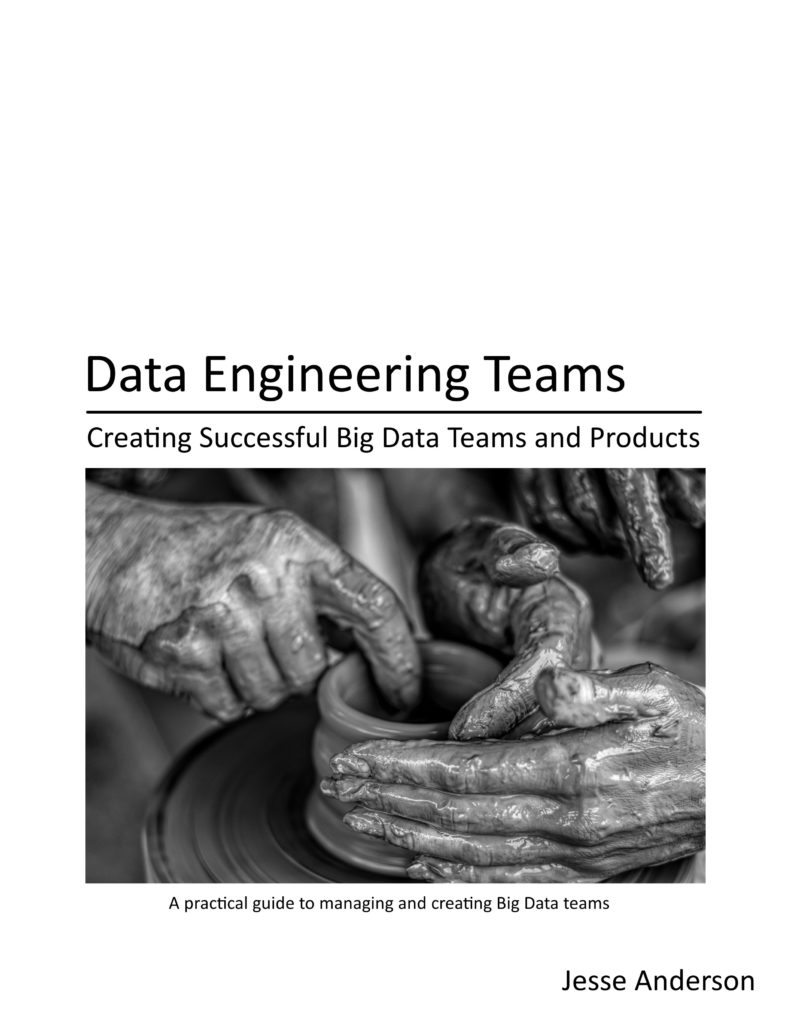
%
Why 85% of Internal Big Data Programs Fail or Get Stuck
While our mentoring clients have a 90%+ success rate
Customer Example: A Completely Overhauled Project in Six Months
“It was frustrating. We were failing and the Vice President was watching us do it. We had all the books and tried to work through the steps, but our use of relationship database systems like MySql and Oracle meant we were approaching Hadoop in a fundamentally incorrect way. Our RDBMS solution was slowing down the Big Data solution.”
“Within two days of finishing the course we had rewritten major components of the database architecture. Over the next six months we completely overhauled everything we had done before we worked with Jesse. The 14 billion rows of data that used to take 16 hours to run were running in 2 hours, and the upgrades saved our company millions of dollars. If you take into account the lost time, and the salaries of our team while we were failing we could have saved a lot more — we really should have worked with Jesse sooner.”
STEVE R.
What’s the difference between the 15% of Big Data initiatives that avoid all the challenges/impediments, and the 85% who don’t?
Or, why is one company successful — while 9 out of 10 fail at least 4-6 ways on average, before getting it to work right?
Most of those 15% winning companies received high-level, masterful mentoring and hands-on expert help throughout the process — to hit that “success mark.” Some openly talk about that help and, most understandably, don’t.
At Big Data Institute, we provide a unique, exceptionally-successful, hard-won, and well-proven approach to helping Big Data teams (and their companies) transition smoothly (and optimally) into the Big Data projects they need — to succeed competitively. We work directly with your existing team — through a powerful knowledge transfer guidance dynamic to give them the missing skills, identify the critical nuances, problems, and the staged support they need. We call this our “Big Data Mentoring.”

Six Critical Steps to Success with Big Data
There are six steps to Big Data Mentoring. They are simple sounding when you hear them. But they are the keys to producing the required performance successes – when integrated and activated under our expert mentorship. Using these six steps, we have helped companies reduce their risk (and accelerate their timelines) and create successful Big Data projects on their first try! These steps are:
- Start by assessing the team and project
- Use case evaluation
- Management and technical training
- Architecture review and evaluation
- Project planning and creation of crawl, walk, and run phases
- Programming and architecture support while coding
Let's talk and schedule a time to go over your project and needs
Step 1: Assessing the Team and Project
What are the team’s technical strengths? What are the project’s complexities and weak points? Has a specific metric been created to say whether a project is successful?
These are 200 questions that need to be answered before starting a Big Data project. To get a well-rounded view of the team and their abilities, we have each team member fill out an in-depth survey. This gives us a starting point of where the team is and where there needs improvement. It allows us to focus on the parts that must be fixed before starting the project or be addressed during the training.
Step 2: Use Case Evaluation
We start helping your team at the very beginning of the project. We help your team understand how designing a Big Data solution is a very different animal than small data. Before you start writing a line of code in a Big Data project, you must deeply understand the use case. We thoroughly review the use case(s) with the team and stakeholders. We ask the questions that your team doesn’t know to ask yet. We look for potential blockers and portions where the difficulty spikes. Planning at this stage pays off by not having to rewrite later on.
Step 3: Management and Technical Training
Next, the teams are trained in Big Data technologies. This doesn’t just apply to the technical teams. We also teach the management team.
Management training is a crucial piece of the puzzle. Poor management of Big Data projects and teams is one of the standard recipes for failure. Managers need to know that a Big Data project is vastly different and more complex than a small data project. They need to learn what is possible and what’s available in the Big Data ecosystem. They need to know the basic steps to creating a Big Data solution and the required iterative approach.
Next, the technical team needs to know how to create data pipelines with Big Data technologies like Hadoop and Spark. This comes in the form of an in-depth and hands-on class on Big Data technologies.
Step 4: Architecture Review and Evaluation
Now that the management and technical teams are trained in Big Data, we move on to choosing the right technologies for the job. We lead a meeting to discuss the use case and determine the technologies. Changing a box or technology on a whiteboard is cheaper than changing it in code. Because the teams have been trained, they are active participants in the meeting; they’re using their domain knowledge and newly acquired Big Data skills to think through the solution.
Step 5: Project Planning and Phases
Once the technologies have been chosen, the project plan can be created. This is another time when a Big Data project differs significantly from a small data project. Taking your team from having no Big Data skills to making a complex data pipeline is a standard recipe for failure. You have to break the plan down into smaller and more manageable pieces. This allows the team to build momentum and build upon previous successes or the next phase of the project. We call this planning to crawl, walk, and run.
Step 6: Programming and Architecture Support
At this point, the team is ready to start coding. We don’t abandon the team at this point; they still need a safety net to ask the pressing questions and get expert help in a timely fashion. We provide the team with email and virtual support for their programming and architecture questions. Getting stuck for days, weeks, or months is costly for a new data engineering team. It’s also an unfortunately common scenario due to the complex nature of Big Data.
The Benefits of Our Mentoring
- Improved team performance: Our mentoring program enhances team performance by providing expert guidance, support, and advice to team members. This can help teams to develop new skills, improve their communication, and work more effectively together. As a result, teams can achieve their goals more quickly and easily, leading to increased productivity and profitability for the company.
- Increased employee engagement: Our mentoring program increases employee engagement by providing employees with a sense of belonging and feeling valued. This leads to increased productivity, decreased turnover, and a more positive work environment as “management understands” the issues they’re facing.
- Increased innovation: Our mentoring program fosters employee and business feedback. This can lead to new products, services, and processes that benefit the company. By encouraging innovation, we can help the company to stay ahead of the competition and continue to grow using data.
- Reduced costs: Our mentoring program reduces costs by having teams work on the right tasks that develop their skills and make progress on business value. This saves the company money as the team no longer wastes time.
- Fostering professional growth and retention: Studies have consistently shown that providing mentorship opportunities to employees not only improves their job satisfaction but also significantly enhances their personal and professional development. Employees are more inclined to forge enduring connections with the company, reducing turnover costs.


We'll help you do a reality check on your Big Data project
Do you have an effective/successful method for assessing your team, their progress, and proper position assignment of the project itself?
When we talk about your situation — I’ll share the basis and reasoning for our methodology, along with a dozen of the factors we access; you’ll see how differently we think for you and your team/company.
During our conversation, we can perform reality checks on these topics:
- Do you have the right people and positions for the project?
- Do you have all the core skills necessary for a data engineering team?
- Does the team have any skill gaps?
- Does the team have any ability gaps?
- Does the management team have reasonable expectations for the outcomes and deliverables of the project?
- Has the team clearly and deeply studied the use cases?
- Were the technologies chosen before the use case was fully understood?
- Does the team have all of the resources they’ll need to develop, test, and deploy the project?
- Does the team already have difficulty just working with small data?
- Does the management team have a sane timeline for the project’s completion?
Unprecendented Success Guarantee
Our track record is significant enough, successful enough, and results certain. If we accept you as a client, we guarantee we will refund our fee pro rata up to 100% if we don’t hit our promised deliverables’ timeline/budget.
Obviously, this guarantee is predicated on your team and leader collaborating fully, executing our directives in a timely manner, and allowing us to have technical influence over the entire team strategy. That part, followed on your side — and if we accept you and your project — we fully expect a monumental success outcome — or we’re the biggest loser, not you! We’ll be accountable to you in progressive, pre-agreed-upon performance stages.

Data Engineering Teams
Creating Successful Big Data Teams and Products
When you collaborate with us (whether at the very beginning of the project — or to successfully turn around a project gone wild) we ALWAYS make certain everyone on your Big Data project team (from leader to technical individual contributors) gain clarity in the nuances and variances we grasp. The ways a team is run, the makeup of the team, the skills, the use case, political atmosphere all make a difference in the successful outcome; so we make certain we transfer expert understanding of it all — if needed.
I wrote one of the more validating books on Big Data, Data Engineering Teams. The book explains my proprietary strategies and systems for how to manage and create Big Data teams, the exact steps I provide organizations/clients to take when creating Big Data solutions.
Think of us as a Big Data Successful Rollout Assurance or think of me.
At the very least - let's talk!
At the very least, let’s talk through your goals, current progress, intended process, and the profiles of the people assigned to the team. Let’s see whether I can make a big difference and whether our perspective has value or not within a one-hour-long conversation.
I wrote the book on fixing and preventing Big Data rollout problems. I want to buy you a copy to introduce my thinking and expertise to you and your team. At worst, it’ll answer many questions you’re probably struggling with, give you directions you’re probably searching for, and answer and solve significant problems or challenges your team is grappling with. And — hopefully, it’ll compel you to feel comfortable and confident discussing these problems and challenges with us risk-free.
